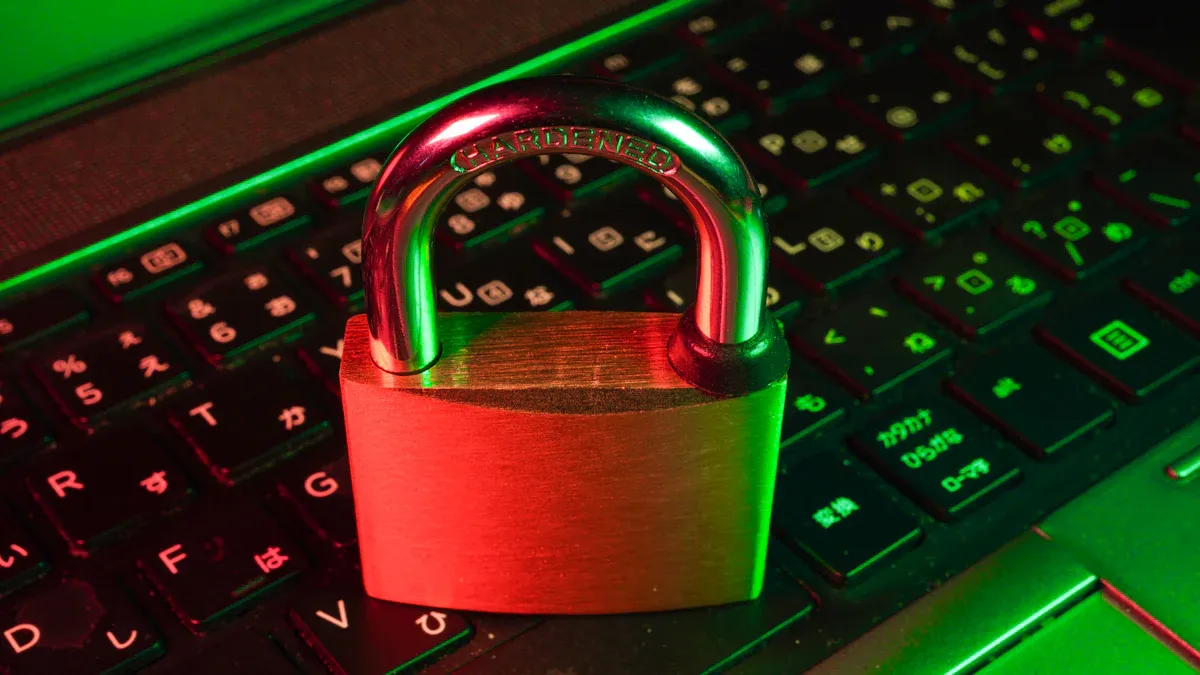
Quantum encryption is a revolutionary method to safeguard your data, utilizing quantum mechanics to create super secure keys that are nearly impossible to break. If an attempt is made to steal these keys, you receive immediate alerts, ensuring your communication remains safe from hackers.
In terms of mobile security, quantum encryption effectively prevents unauthorized access to your information, maintaining its strength even as computer technology advances. The Vertu Quantum Flip, a premier quantum encryption phone, exemplifies this innovation. With its advanced BB84 Encryption, this device offers unparalleled privacy and security, transforming the way you protect your mobile data.
Key Takeaways
-
Quantum encryption uses special science to make safe keys that are very hard to hack, keeping data safe.
-
Quantum key distribution (QKD) warns you right away if someone tries to steal your data, giving instant protection.
-
This is important because old ways of encryption get weaker as computers, especially quantum ones, get smarter.
-
Phones like the Vertu Quantum Flip use quantum encryption, mixing smart hardware and software for better mobile safety.
-
As quantum encryption spreads, it will create new rules for keeping our digital lives private and secure.
What is Quantum Encryption?

The principles of quantum cryptography
Quantum cryptography uses quantum mechanics to keep communication safe. It relies on special traits of quantum particles to make strong and trustworthy encryption. Four main ideas support this technology:
-
Superposition: A qubit can be in many states at once. This helps encode data and spot interference easily.
-
Entanglement: Two quantum particles stay linked, even far apart. This link shows if someone tries to mess with the data.
-
Heisenberg's Uncertainty Principle: Checking one part of a quantum system causes uncertainty in another. This helps catch spying during data transfer.
-
No-Cloning Theorem: Exact copies of unknown quantum states can't be made. This keeps your data safe from silent spying.
These ideas make quantum cryptography a powerful way to protect information. It offers security that traditional methods can't match.
How quantum encryption ensures secure communication
Quantum encryption uses quantum key distribution (QKD) to keep communication safe. QKD creates keys that hackers can't break. If someone tries to spy, the system warns you right away. This quick alert makes it great against cyber threats.
Tests show quantum-safe cryptography works well in tough network conditions. It keeps connections secure even in tricky situations. This strength is key to defending against future quantum computer risks.
By mixing advanced encryption with quantum-based checks, quantum encryption keeps your communication private and safe. It blocks unauthorized access and protects your data.
Why quantum encryption is critical in the digital age
Today, secure communication is more important than ever. Old encryption methods are getting weaker as technology grows. A strong quantum computer could break current systems. This makes quantum encryption a must-have.
Groups like NIST have made new rules for encryption that resist quantum attacks. Big companies like Apple, Google, and IBM are adding quantum-safe encryption to their products. These actions show how vital quantum encryption is for protecting digital information.
Quantum encryption not only secures your data but also sets higher safety standards. It keeps your information private, even against new dangers. As technology changes, this tool will be key to safe communication and trust.
How Quantum Encryption Works in Mobile Phones
The role of quantum key distribution in mobile security
Quantum key distribution (QKD) helps keep mobile devices secure. It makes special keys using quantum mechanics to stop unauthorized access. These keys are unique and can't be copied or stolen without being noticed.
If someone tries to spy on your data, QKD warns you right away. This happens because messing with quantum particles changes their state. That change acts as a signal, showing your data might be in danger.
In mobile security, QKD makes encryption stronger. It protects against hackers, even those using powerful quantum computers. Your private information, like passwords and bank details, stays safe.
How superposition and entanglement enable secure key exchange
Superposition and entanglement are key ideas behind quantum encryption. They help phones share keys safely without being intercepted.
-
Superposition lets data exist in many states at once. This helps find interference during key sharing.
-
Entanglement links two particles, even if far apart. If someone tries to steal the key, the link changes, revealing the spy.
-
Changing one entangled particle affects the other. This makes it easy to spot spying attempts quickly.
These ideas make key sharing very secure. Hackers can't steal your keys. Quantum encryption phones use these principles to provide better security than older methods.
Quantum encryption phone integration: hardware and software considerations
Adding quantum encryption to phones needs special hardware and software. Phones like the Vertu Quantum Flip use advanced tech for secure communication.
Hardware includes parts to handle quantum key distribution. For example, sensors detect quantum particles, and processors run encryption tasks. The Vertu Quantum Flip uses a Snapdragon 8 Gen4 chip for smooth performance and quantum encryption.
Software is just as important. These phones use smart programs to manage keys and spot tampering. The software works instantly, warning you if someone tries to steal your data. The BB84 Encryption in the Vertu Quantum Flip is a great example of this.
By combining top-notch hardware and software, quantum encryption phones protect your communication. They set a new level of privacy and security for mobile devices.
Benefits of Quantum Encryption for Mobile Security
Protection against quantum computing threats
Quantum-resistant encryption keeps your data safe from quantum computers. These powerful machines might break old encryption, risking your information. But quantum cryptography solves this problem. It makes special keys that quantum computers can't crack.
Using quantum-resistant encryption protects your mobile devices from future cyber risks. It keeps your private data, like bank info and messages, secure. As quantum computers improve, quantum-safe cryptography will stay important for mobile safety.
Enhanced secure communication and data privacy
Quantum cryptography makes communication safer with strong protection. It ensures only you and the receiver can see shared data. This works through quantum-resistant encryption, which blocks others from accessing your information.
With quantum-safe cryptography, your mobile chats and data stay private. Whether sharing personal info or doing business, your data is safe. This higher level of privacy improves mobile security, giving you confidence in today's connected world.
Real-time tamper detection and prevention
Quantum cryptography can spot and stop tampering instantly. Quantum key distribution (QKD) uses quantum states to make keys. These states are very sensitive to changes.
If someone tries to steal the key, the quantum state shifts. This warns both you and the receiver right away.
This feature catches unauthorized access before it harms your data. Quantum-resistant encryption uses rules like the Heisenberg uncertainty principle to show tampering. Adding QKD to phones gives you a strong way to protect your data and communication.
Challenges and Limitations of Quantum Encryption in Mobile Applications
Complexity of integrating quantum cryptography into mobile devices
Adding quantum cryptography to phones is not easy. Phones have limited power and speed, making it hard to run complex encryption. These advanced methods can slow down how fast your phone works.
Another problem is compatibility. Quantum key distribution (QKD) must work with current networks. This needs big changes to technology. Also, QKD often requires special tools and private lines, which cost more and add difficulty.
Here’s a simple list of the challenges:
|
Challenge Type |
الوصف |
|---|---|
|
Slower encryption and decryption can affect device speed. |
|
|
Limited Resources |
Phones lack the power to handle complex quantum encryption. |
|
Compatibility Problems |
QKD must fit with current mobile networks, which is hard to achieve. |
|
Special Equipment Needed |
QKD requires unique tools and private lines, raising costs and complexity. |
|
Battery Usage |
Quantum encryption uses more power, draining batteries faster. |
These issues make it tricky to add quantum cryptography to mobile security.
Hardware and infrastructure requirements for quantum encryption
Quantum encryption needs new hardware and system updates to work well. Phones need better parts, like UEFI, to handle quantum-safe encryption. Trusted Platform Modules (TPMs) also need upgrades to meet new standards.
Some examples of needed hardware are:
-
Cisco 8100 router: Uses quantum-safe methods for secure startup.
-
Cisco Catalyst 9500 switch: Adds quantum-safe security features.
-
Cisco Firewall 4215: Protects code with secure startup checks.
These updates help phones use quantum encryption while staying secure.
|
Hardware Component |
Requirement |
الوصف |
|---|---|---|
|
UEFI |
Upgrade |
Handles quantum-safe encryption and keys |
|
TPM |
Update |
Supports new quantum-safe rules |
|
Secure Boot |
New Feature |
Follows updated NIST quantum-safe standards |
Potential impact on battery life and device performance
Quantum encryption can drain your phone’s battery quickly. It uses more power than regular encryption for tasks like key sharing. This can make your battery run out faster.
It can also slow down your phone. High-end phones, like the Vertu Quantum Flip, can handle this. But regular phones might struggle to keep up.
To fix this, companies are working on energy-saving methods and better hardware. Still, balancing strong security with good performance is a tough problem for mobile devices.
Future Implications of Quantum Encryption for Mobile Security
How quantum encryption is improving
Quantum encryption has grown a lot in the last 10 years. New ideas and tech have made it more useful. For example, quantum key distribution (QKD) now works over 50 kilometers using regular telecom fibers. A study in Nature Photonics showed secure key rates of 110 Mbps over 10 kilometers. These breakthroughs show how quantum cryptography is becoming practical for real-world use.
Scientists are also exploring satellite-based quantum communication. They sent secure keys over 1,200 kilometers, proving long-distance safety is possible. These successes show how fast quantum cryptography is improving. Soon, it could be part of mobile phones and other everyday devices.
|
Research Progress |
Details |
Key Achievement |
|---|---|---|
|
New QKD Protocol |
Secure keys sent over 50 kilometers. |
Better real-world use of QKD. |
|
QKD in Nature Photonics |
Achieved 110 Mbps secure key rates. |
Stronger quantum encryption abilities. |
|
Satellite-based Quantum Communication |
Sent secure keys over 1,200 kilometers. |
Proved long-distance secure communication. |
Quantum encryption in everyday devices
Quantum cryptography is becoming more popular. Experts think the market will grow to $9.87 billion by 2033, with a yearly growth rate of 36.5%. This rise shows how much people need better security as cyber threats increase. A 2022 survey found 66% of companies plan to use quantum-safe cryptography by 2030. This means quantum encryption could soon be common in phones and other devices.
Old encryption methods are weak against quantum computers. Industries like finance and healthcare need safer ways to protect data. Because of this, quantum cryptography in mobile devices will likely grow quickly. It will help keep your personal information safe in a connected world.
Changing mobile security with quantum encryption
Quantum encryption could change how we protect mobile devices. Current encryption might fail against quantum computers. Post-quantum cryptography (PQC) is being developed to fix this. PQC uses special algorithms that resist quantum attacks. Groups like NIST are working to make these tools widely available.
Companies need to prepare for PQC by testing its effects on their apps. For example, using CRYSTALS-Kyber for key exchanges can make phones safer. As quantum encryption spreads, it will set new rules for privacy and security. This will keep your mobile data safe from future dangers.
Tip: Keep learning about quantum cryptography. It will help you understand how it might protect your phone in the future.
Quantum encryption is key to keeping your phone safe from hackers. It protects your private data, even against powerful quantum computers. This new technology could change mobile security, giving you better safety and peace of mind.
Old encryption methods are becoming less secure, making updates urgent. Banks and governments are already using stronger post-quantum tools. Groups like NIST plan to stop using old systems by 2030. Using quantum encryption now is crucial to protect your digital life.
التعليمات
1. How is quantum encryption different from regular encryption?
Quantum encryption uses special science to make super safe keys. These keys can't be copied or stolen. It also spots tampering right away, keeping your data safe from new threats like quantum computers.
2. Can quantum encryption stop hackers from breaking into my phone?
Yes! Quantum encryption makes keys that are impossible to break. If someone tries to steal your data, it warns you instantly. This helps you act fast before any damage happens.
3. Do all phones have quantum encryption?
No, only certain phones like the Vertu Quantum Flip have it. These phones use special tools and programs to make sure your data stays secure.
4. How does quantum encryption make phone communication safer?
Quantum encryption keeps your chats private by stopping unwanted access. It uses special keys to protect things like messages, passwords, and bank info.
5. Will quantum encryption make my phone slower?
Newer phones like the Vertu Quantum Flip can handle it easily. But older phones might slow down because quantum encryption is more complex.




